
We kindly inform you that, as long as the subject affiliation of our 300.000+ articles is in progress, you might get unsufficient or no results on your third level or second level search. In this case, please broaden your search criteria.


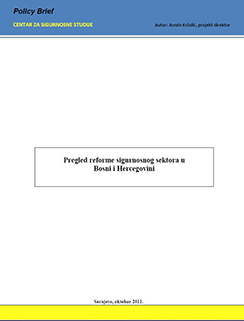

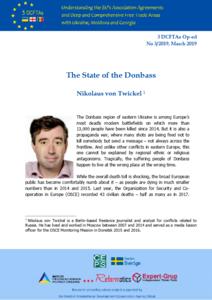
The Donbass region of eastern Ukraine is among Europe’s most deadly modern battlefields on which more than 13,000 people have been killed since 2014. But it is also a propaganda war, where many shots are being fired not to kill somebody but send a message – not always across the frontline. And unlike other conflicts in eastern Europe, this one cannot be explained by regional ethnic or religious antagonisms. Tragically, the suffering people of Donbass happen to live at the wrong place at the wrong time.
More...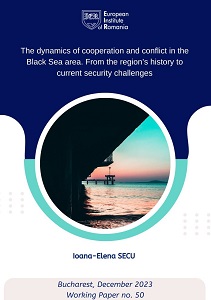
This paper aims to analyse the cooperation and security dynamics that characterise the Black Sea Region (BSR) since the Russian military aggression against Ukraine in February 2022, while also considering the major historical developments in the area. The study examines the interests and actions of various actors in the region, focusing on the European Union (EU), the North Atlantic Treaty Organisation (NATO), Turkey, the Russian Federation, Ukraine, and Romania. By using qualitative research and analysis of archival discoveries, governmental documents, official speeches, media news, and scientific papers, this working paper seeks to shed light on the complex political and security considerations that shape the future prospects of the Black Sea region.
More...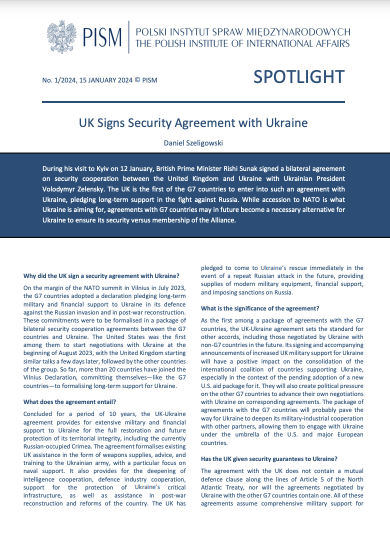
During his visit to Kyiv on 12 January, British Prime Minister Rishi Sunak signed a bilateral agreement on security cooperation between the United Kingdom and Ukraine with Ukrainian President Volodymyr Zelensky. The UK is the first of the G7 countries to enter into such an agreement with Ukraine, pledging long-term support in the fight against Russia. While accession to NATO is what Ukraine is aiming for, agreements with G7 countries may in future become a necessary alternative for Ukraine to ensure its security versus membership of the Alliance.
More...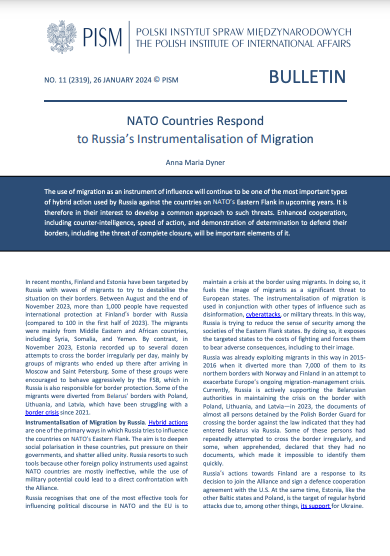
The use of migration as an instrument of influence will continue to be one of the most important types of hybrid action used by Russia against the countries on NATO’s Eastern Flank in upcoming years. It is therefore in their interest to develop a common approach to such threats. Enhanced cooperation, including counter-intelligence, speed of action, and demonstration of determination to defend their borders, including the threat of complete closure, will be important elements of it.
More...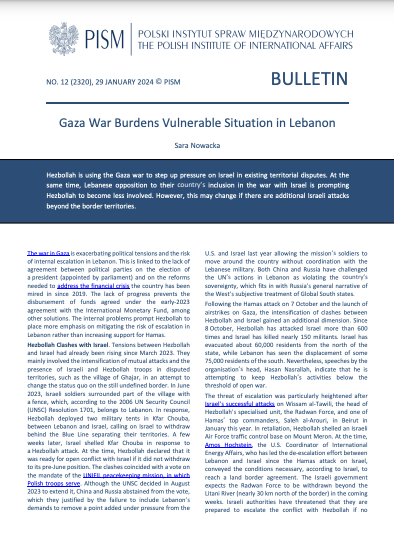
Hezbollah is using the Gaza war to step up pressure on Israel in existing territorial disputes. At the same time, Lebanese opposition to their country’s inclusion in the war with Israel is prompting Hezbollah to become less involved. However, this may change if there are additional Israeli attacks beyond the border territories.
More...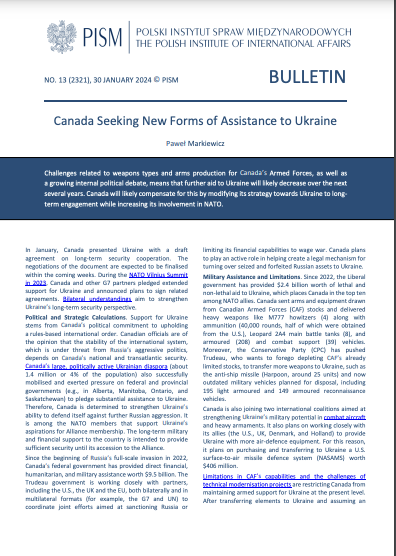
Challenges related to weapons types and arms production for Canada’s Armed Forces, as well as a growing internal political debate, means that further aid to Ukraine will likely decrease over the next several years. Canada will likely compensate for this by modifying its strategy towards Ukraine to long-term engagement while increasing its involvement in NATO.
More...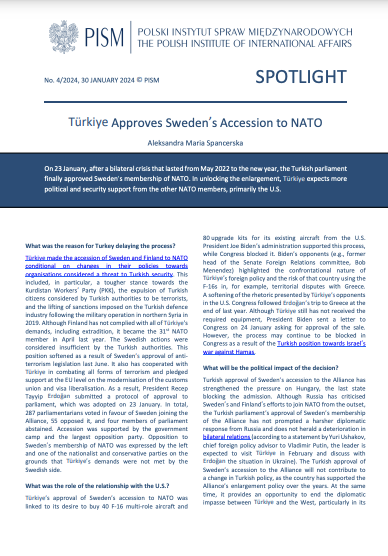
On 23 January, after a bilateral crisis that lasted from May 2022 to the new year, the Turkish parliament finally approved Sweden’s membership of NATO. In unlocking the enlargement, Türkiye expects more political and security support from the other NATO members, primarily the U.S.
More...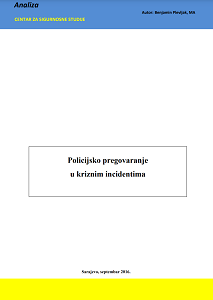
Krizni incidenti predstavljaju izuzetno kompleksne događaje s kojima se suočavaju policijske strukture širom svijeta. Pregovarački timovi iz SAD ih svrstavaju u tri velike kategorije: talačke situacije, slučajevi sa zabarikadiranim pojedincima i slučajevi sa osobama koje prijete izvršenjem samoubistva (Wind, 1995). Od navedenih oblika kriznih incidenata, talačke situacije predstavljaju najgori scenario jer su životi nedužnih osoba izloženi direktnoj opasnosti. Također, često se dešava da otmičari imaju neki oblik psihičkog poremećaja što dodatno usložnjava cjelokupnu situaciju u pogledu nepredvidivosti toka događaja. Zbog toga, ne treba čuditi da rješavanje talačkih situacija može potrajati satima, pa čak i danima – npr. pregovarački tim za talačke situacije njujorške policije bio je uključen u rješavanje incidenta koji je trajao više od 50 sati i u kojem je bilo angažovano 17 policijskih pregovarača (Miller, 2007). S druge strane, zadatak profesionalnih pregovaračkih timova je miroljubivo riješiti problem bez ljudskih gubitaka ili povreda. To podrazumijeva brigu za sigurnost taoca, policijskih službenika, ali i samih otmičara. U takvim okolnostima, upotreba sile, odnosno vještina specijalnih policijskih jedinica posljedna je opcija, osim u slučajevima kada su životi osoba u neposrednoj opasnosti. Pregovaranje se pojavljuje kao ključni postupak u miroljubivom iznalaženju rješenja. Primjeri iz američke policijske prakse to potvrđuju jer se pregovaranje pokazalo djelotvornim u prevenciji ljudskih gubitaka u 95 posto slučajeva (Miller, 2005).
More...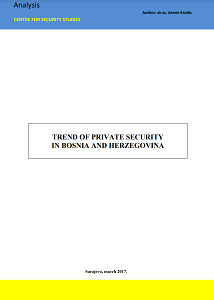
The privatization of the security sector in Bosnia and Herzegovina (BiH) has not received much attention. Apart from the research of the Center for Small Arms Control in South Eastern Europe and Eastern Europe (SEESAC), which analyzed the state of the private security sector in South East Europe, as well as the research of the Center for Security Studies (CSS) from 2009, this is the second local research of the private security sector in Bosnia and Herzegovina. The aim of this research is to determine the trend of private security in BiH by comparing data obtained in 2009 and 2016. In order to provide a better understanding of the number and scope of private security in BiH, compared statistical data collected which show the scope of private security, i.e the number of legal subjects engaged in such activities and the number of certified staff working in this sector, will be presented below.
More...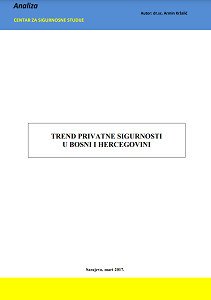
Privatizaciji sigurnosnog sektora u Bosni i Hercegovini (BiH) posvećeno je vrlo malo pažnje. Pored istraživanja Centra za kontrolu lakog naoružanja u jugoistočnoj i istočnoj Europi (SEESAC), kojim je analizirano stanje privatnog sigurnosnog sektora u jugoistočnoj Europi, kao i istraživanja Centra za sigurnosne studije (CSS) iz 2009. godine, ovo je drugo domaće istraživanje sektora privatne sigurnosti u BiH. Ovim istraživanjem nastojao se utvrditi trend privatne sigurnosti u BiH komparirajući podatke iz 2009. i 2016. godine. Radi boljeg razumijevanja brojnosti i veličine privatne sigurnosti u BiH, u nastavku će biti predstavljeni i komparirani prikupljeni statistički podaci koji pokazuju obim privatne sigurnosti, odnosno brojnost pravnih subjekata koji se bave takvim poslovima, kao i broj certificiranog osoblja.
More...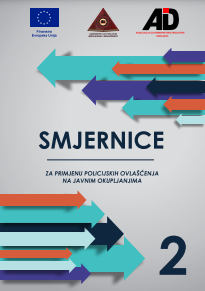
Shodno međunarodnopravnim, a prije svega evropskim standardima, normativna regulisanost prava na slobodu okupljanja podrazumijeva afirmisanje pretpostavke u korist održavanja. To podrazumijeva da se u zakonu sloboda javnog okupljanja treba tako regulisati da se ona uvijek podrazumijeva da je prisutna, sem u zakonom taksativno navedenim situacijama. Suprotno određenje (da se u zakonu normira da je javno okupljanje dozvoljeno u taksativno navedenim situacijama) je svakako pogrešan nomotehnički, ali i fundamentalni pristup. To podrazumijeva i da za javno okupljanje, po pravilu, nije nužno dobijanje dozvole od strane javnog organa, već ga je dovoljno samo prijaviti. Stoga, podrazumijeva se da pravo na javno okupljanje podrazumijeva i spontana okupljanja.
More...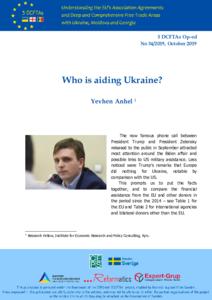
The now famous phone call between President Trump and President Zelensky released to the public in September attracted most attention around the Biden affair and possible links to US military assistance. Less noticed were Trump’s remarks that Europe did nothing for Ukraine, notable by comparison with the US. This prompts us to put the facts together, and to compare the financial assistance from the EU and other donors in the period since the 2014 – see Table 1 for the EU and Table 2 for international agencies and bilateral donors other than the EU.
More...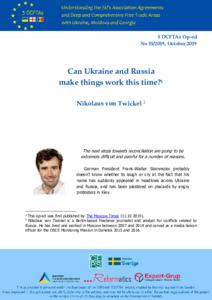
The next steps towards reconciliation are going to be extremely difficult and painful for a number of reasons. German President Frank-Walter Steinmeier probably doesn’t know whether to laugh or cry at the fact that his name has suddenly appeared in headlines across Ukraine and Russia, and has been plastered on placards by angry protesters in Kiev.
More...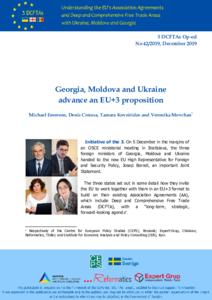
Initiative of the Three. On 5 December in the margins of an OSCE ministerial meeting in Bratislava, the three foreign ministers of Georgia, Moldova and Ukraine handed to the new EU High Representative for Foreign and Security Policy, Josep Borrell, an important Joint Statement. The three states set out in some detail how they invite the EU to work together with them in an EU+3 format to build on their existing Association Agreements (AA), which include Deep and Comprehensive Free Trade Areas (DCFTA), with a “long-term, strategic, forward-looking agenda”.
More...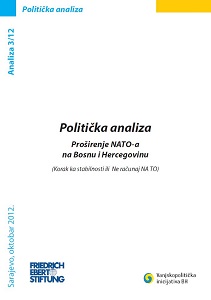
The purpose of this analysis is not to theoretically elaborate the concept of the NATO alliance and all its military and civilian aspects, but to determine the elements of the true political determination of Bosnia and Herzegovina for membership in that alliance, the causes of politicization that led to a halt in the accession process, the hostage situation of the authorities in BiH. institution and geopolitical consequences of non-membership of Bosnia and Herzegovina in NATO for regional stability.
More...
As always in Albania, settling accounts with the past plays a large part in the reality of the present causing the country to remain entrenched in conflictual politics. A new political and national identity is still in the process of formation, whilst the country remains beset by its geographical position in a Balkan peninsular rent by the uncertainties of war and economic collapse. Former President Sali Berisha is becoming increasingly unstable and contemptuous of both internal public and international opinion. Almost daily he issues personal attacks on various members of the governing Socialist Party and also upon foreign diplomats, thereby encouraging the already noticeable trend towards xenophobia that is evident throughout Albania.
More...